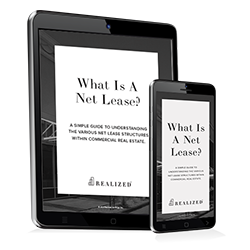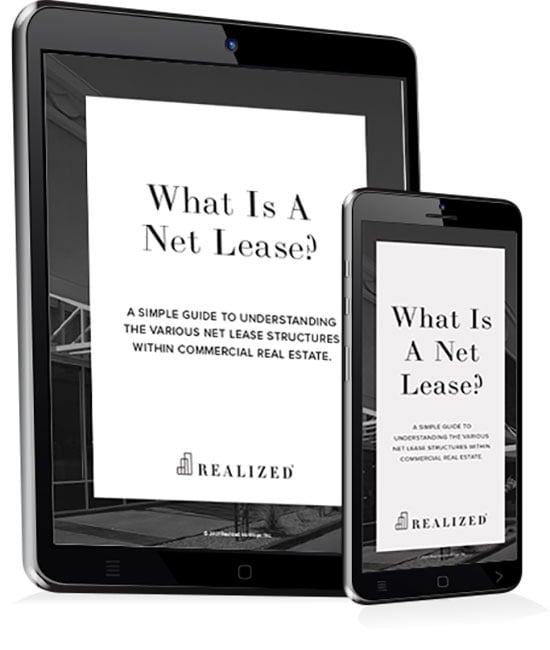
Lease arrangements can be complex, but there is a specific group of well-known lease types that provide a few options for tenants without too much complexity. These are called net leases. In this article, we’ll discuss what a double net lease is and how it compares to other net lease types.
Double Net Lease Defined
A double net lease is a common arrangement in commercial real estate. It is a type of lease agreement where the tenant is responsible for property taxes, insurance premiums, and some degree of base rent. The landlord is responsible for structural repairs. The landlord still has obligations for taxes and insurance since those remain in his name; however, the tenant still pays his share of those obligations directly to the landlord as reimbursement.
Because taxes and insurance are paid directly to the landlord, the landlord is responsible for the management of these expenses. That includes ensuring the expenses are split correctly across tenants, notices are sent out in a timely manner, and that tenants are paying on time. If some tenants are late with their payments, the landlord will most likely need access to liquid capital to cover the expenses.
In a multi-tenant scenario, these expenses may be passed along proportionally and are usually divided up by square footage.
Double Net vs. Other Types of Leases
As mentioned above, in a double net lease, the tenant is responsible for insurance and taxes, while the landlord is responsible for paying for structural repairs. There are other net lease types available, however, which move around how costs are divided up between the landlord and tenant.
- Single Net — A less common type of lease used in commercial real estate, in a single net lease, the tenant pays rent plus property taxes. The landlord is responsible for everything else.
- Triple Net / Absolute Net — Also sometimes called “NNN.” The tenant pays for taxes, insurance, and maintenance. The tenant will still pay some degree of base rent, however, it is typically lower than other net lease types to compensate for some of the higher costs the tenant is responsible for. Note that if there are structural issues, the landlord is generally responsible for paying them. For example, if the roof starts leaking, it is the landlord’s responsibility to fix it. If the lease were absolute net, the tenant would then be responsible for the structural portions of the property, as well as the other operating expenses covered in a triple net lease.
- Gross Lease — In a gross lease, the tenant only pays base rent, which can be relatively high compared to other net lease types due to the fact they are not directly paying for taxes, insurance, and maintenance. In this type of agreement, the landlord often can periodically update the rental payment based on future expenses.
Pros and Cons as a Landlord
As a landlord, when making a decision about a double net lease, there are a few pros and cons to wager:
Pros
- Able to control expenses better than a single-net or gross lease types.
- Have control over structural portions of the property.
Cons
- Financial responsibility of maintaining the structural portions of the property.
- Possibility of large, unexpected costs.
As a landlord, paying attention to third party reports, such as appraisal and property condition reports, can help make sure your investment is well-capitalized enough to cover any unexpected costs that may arise related to the structural portions of the property.
Pros and Cons as a Tenant
The tenant certainly has an evaluation to make as well when deciding to go with a double net lease. Here are a few points to consider:
Pros
- Lower monthly rent compared to a single net lease.
- Less financial management compared to a triple net or absolute net lease.
Cons
- As most leases favor the landlord, the tenant must be able to negotiate lease terms effectively to make sure they aren’t overpaying base rent.
- Need to do a cost analysis of potential insurance and tax premiums compared to paying a higher base rent in the form of a gross or single-net lease and assess if value exists.
To no surprise, double-net leases have advantages and disadvantages for both landlords and tenants. Before entering into any lease agreement, such as a double-net, make sure you understand the nuances of the lease agreement as well as how costs are allocated to each interested party to ensure the structure is in-line with what you are trying to accomplish. For example, if you are a tenant looking for a large amount of control and flexibility over the improvements of the property, perhaps a triple-net or absolute net lease is more in your wheelhouse.
This material is for general information and educational purposes only. Information is based on data gathered from what we believe are reliable sources. It is not guaranteed as to accuracy, does not purport to be complete and is not intended to be used as a primary basis for investment decisions. It should also not be construed as advice meeting the particular investment needs of any investor.



